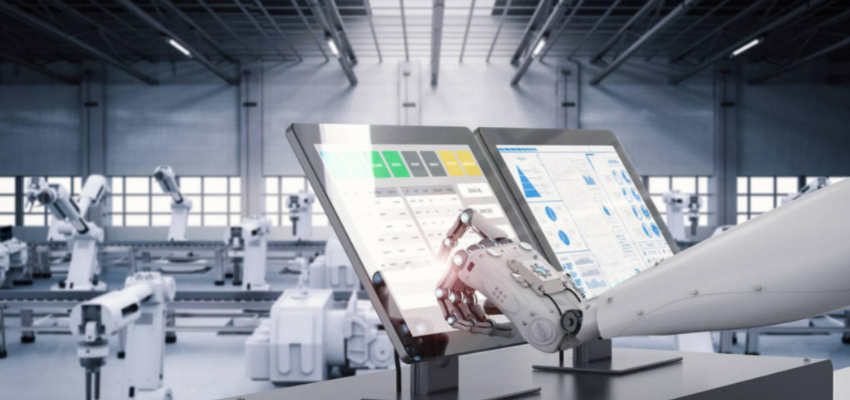Show:
How Is Automation Reshaping the Supply Chain?
Technology is changing all aspects of life, transforming management chains from the ground up. While it may seem difficult to adapt and employ new processes, their benefits can impact your business positively.

Digital transformation in the supply chain can bring incomparable benefits to your profit margins. And they can increase the quality of life for your employees. From automated software upgrades to Modula storage solutions, you can find various new digital tools ready to bring your business to the next level.
Let’s learn how automation reshapes supply chain activities and management, starting with these five ideas worth keeping in mind for the near future.
How is technology changing supply chain management?
A survey by Deloitte found that 76% of respondents active in different industries found emerging digital and analytics resources essential to delivering supply chain strategies.
Adopting technology-backed developments can show improvements in various aspects of your business. They can lead to more reliable delivery times, increased revenues due, in part, to reduced costs, and diminished stocks.
McKinsey says that things could change even more in the near future. By 2030, you could witness the emergence of an entirely new logistics concept powered by new technologies like robots, 3D printing, manufacturing, and more.
Some trends can radically transform supply chain management. Keep reading to know what to look for in the coming years.
1. Cost cuts in shipping, logistics, and delivery
Net technology is bound to change how the world works. That includes various services whose costs can be greatly diminished. That includes shipping, logistics, and delivery. Amazon already made headlines with its implementation of drone delivery, and they’re not the only enterprise giant using technology to streamline its facilities, in this case, its delivery services.
UPS is another brand you may have heard about. The company adopted several AI-powered technologies meant to improve customer experience and reduce delivery costs, among other reasons. It now paves the way for other brands to adopt automation solutions, thus improving quality of life and streamlining delivery services.
UPS methods include:
- EDGE – a platform for internal logistics and operations that leverages real-time data to assist staff in making better decisions
- ORION – a patented route optimization algorithm expected to reduce over 100 million delivery miles
- Drone delivery tests – UPS’s effort to stay up with Amazon’s lofty aspirations.
Keep in mind that UPS and Amazon are only two examples from the market. Many companies are working on digitizing and automating their supply chains. We will surely see more automation across all points in the supply chain in the future, from robots to ships that drive themselves.

2. Software upgrades productivity in the workforce
Technology and automation are taking over the workplace. As a result, it becomes more integrated and digital because new solutions are replacing old ones.
There are solutions for the digital-first supply chains of the current age. Oracle Fusion Cloud SCM, Suuchi, SAP Supply, and Requis are just a few examples of useful supply chain platforms. They provide thorough resolutions for the times we live in.
Each vendor has a specific target audience and specific use cases. Each vendor promotes the features that bring the best results. Some of the most commonly known features include:
- Project management, communication, and cooperation tools
- Intuitive dashboards with quick access to common tasks
- Reporting, data, and analytics solutions in real time
- Administration of transportation
- Dynamic inventory management and allocation.
Some of the available platforms are built with the digital revolution in mind. They can integrate new technology like the Internet of Things or AI, making it easier to adapt to automation altogether.
3. Blockchain facilitates end-to-end supply chain visibility
By ensuring that data is reliable and secure, blockchain technology can improve the transparency, robustness, and efficiency of supply chains.
A survey by IBM found that many supply chain data issues are caused by incompetence and human mistakes. It shows that more than 70% of supply chain leaders consider that eliminating human participation improves various aspects of the data (mainly quality, integrity, visibility, and speed).
Blockchain delivers a solitary real-time source of truth. Thus, it eliminates needless complexity and offers trustworthy insights throughout the supply chain process.
These improved understandings can offer crucial improvements spanning the supply network frame. That includes resiliency to increase performance and lifted expectations when it comes to vendors, customers, and affiliates.
4. New technology empowers autonomous supply chains
The revolution started with autonomous manufacturing and supply chain planning options. These facilities lead to what we now know as autonomous supply chains. Every step in the supply chain can be subject to automation if need be.
Automation has an impact on supply chains, as you can see from a closer look. You can notice its influence in the following aspects:
Tasks currently performed by workers could soon be replaced by AI, which will intensify tasks. That includes decision-making responsibilities usually given to people (compliance, spend analysis, assessments, etc.).
Automation is indicative of the fact that freight supply, for example, will need fewer people to carry out operations in the technical and manual stages. That usually leads to a smaller workforce.
Robotics and 3D printing are slowly but steadily creeping into the manufacturing stage. They’re automating building stages, leading to an increase in efficiency and a reduction in production schedules.
Autonomous supply networks will become more reliable as time goes by. That translates to fewer errors and more cost-efficient performance in the future. In turn, the entire business can be more sustainable.
But that doesn’t mean people will disappear from the supply chain ecosystem completely. They will always be there to some extent. It just means we will see much more automation and digital enhancement in the years to come.

5. Transparent access to information related to the supply chain
Businesses that own several warehouses across the country or globally can manage their inventories and day-to-day activities better. They can use standardized networks that employees or shareholders access through a digitized platform.
This type of automation facilitates quick data distribution and real-time visibility and transactions. That way, they have unencumbered and clear access to all the data and activity pertaining to the supply chain.
Of course, that can also include technology that oversees various essential business aspects.
In the case of a farming business, for example, warehouses can use automated technology with inbuilt humidity and temperature control. It facilitates maintaining the right parameters for storage, protecting the contents from spoilage or pest infestation.
Warehouse infrastructure can benefit from tracking technology and digital records maintenance systems accessible via the Internet. That leads to more protection relating to stored commodities and safer storage functions. It gives rise to a better quality of life and more precise storage management throughout multiple warehouses if need be.
Conclusions
Automation solutions carry certain implications for supply chain administration, employees, and business leaders.
Cross-training and upskilling employees will become a regular thing to keep them productive and relevant in the ecosystem as digital transformations take place.
Automation is why digital adoption has been steadily growing in recent years. It could be a concern for many employees, but this change is just the first of many.
The digital revolution in the supply chain pledges to impact customer expectations, product creation, development, distribution, supply chain, and more.
About the author:
Travis Dillard is a business consultant and an organizational psychologist based in Arlington, Texas. Passionate about marketing, social networks, and business in general. In his spare time, he writes a lot about new business strategies and digital marketing for SEO Thugs.

 Return to Previous Page
Return to Previous Page








